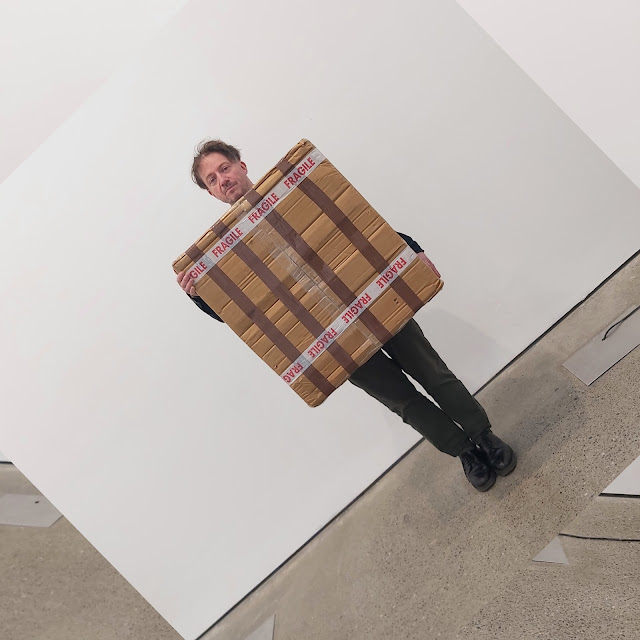
Reflections from a series of four residencies completed by Micheál O'Connell at Uillinn: West Cork Arts Centre in 2021 and 2022 to create new work in response to an Arts Council Commissions Award granted in 2020. Initially the work forms a solo exhibition, 'System Interference', which opened at Uillinn on 17th Sep. 2022, and will then, thanks to Touring and Dissemination funding, travel to Wexford Arts Centre (from Aug. 2023) and Highlanes Gallery, Drogheda (opening Nov. 2023).
Monday, April 11, 2022
Residency 3, Day 3: 'I construct, develop and understand my way to new work through the physical activity of making.' - Amanda Coogan
Could the quote, above, from Amanda Coogan, minus the two words 'of making' (and the 'the' before 'physical activity' obv.) be something to adopt? Each to their own, right? Minimalism, as a trend or movement, happened a long time ago and art history is peppered with other attempts to disassociate from the hand, or even the eye, and certainly the various sets of traditional craft skills, but things have regressed. The essence of photography for example, is that no effort is required to create mesmerisingly precise representions of scenes, things, people, and let's not forget cats, but still many insist that the little bit of talent involved in pressing a (shutter-release) button, or simply appropriating images, constitutes activity similar to the handicraft of old. Hostility to the idea of 'making' does not go down well with many, and triggers retorts of the 'But you are making; of course you are!' variety. 'Look, even though you ordered that thing from an online shop, and it was produced in a factory in China, and then transported via distribution centres and smaller warehouses, wholesalers and retailers, and ended in your hands eventually: because you are presenting it in a different context to intended, that is making'. Part of me thinks fine, but isn't that broadening of the notion of 'making' in precisely the way you lot, usually, appear averse to, so that esoteric, and even anti-art approaches are brought under comfortable umbrellas, a bit odd? I realise that even the arguments I am putting here are tired. For my part, I feel opposed to both making and escapism; the latter being generally seen as a key part of the artist's role as well, but more about the objections to it later. Thirdly, the common implication (you hear it from scientists who collaborate with artists especially) that art is about locating or creating something called beauty, is infuriating, as if the job were to prettify a barbarous world, or put crudely, 'turd polishing'. Avoiding any of these (making, escapism, of inadvertently finding beauty or enchantment amidst the horror) is impossible, especially if their definings are expanded. When one thinks about these matters for any length of time, the incongruities mount up, but, as I say, steering clear of such specious assumptions about what art is, remain important intentions for me. Today at Uillinn, Photo credits Louise Forsyth:
Subscribe to:
Post Comments (Atom)

No comments:
Post a Comment